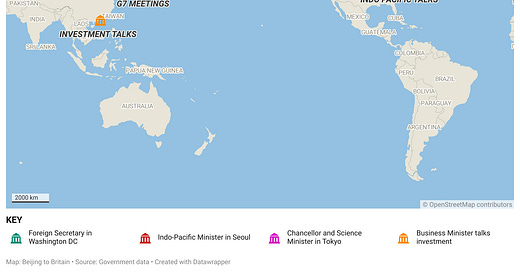Hello,
Senior politicians, including the UK’s Chancellor (Finance Secretary), have been in Japan this week ahead of the G7 meeting taking place in Hiroshima on Friday. Hot on the agenda have been discussions around ways to mitigate China’s use of economic coercion, and it feels likely that we will see output reflecting this in the official communique later this week, and around Taiwan too. From the UK’s standpoint, the event will be the first time the British Government flexes its new China approach at a meeting with key allies and partners; expect multiple bilateral engagements and readouts to this end.
Back home, the news that his predecessor, the UK’s shortest-serving Prime Minister, Liz Truss, has been invited to speak in Taiwan by its Ministry for Foreign Affairs raised eyebrows. Among politicians, stinging criticism from Foreign Affairs Committee Alicia Kearns garnered the most attention. She said “[t]he trip is performative, not substantive. It is the worst kind of example of Instagram diplomacy.” Truss’s speech will no doubt trigger some breathless media commentary about how it ‘undermines Prime Minister Rishi Sunak’s China strategy’ or something similar - this can largely be discarded. Truss is within her right to speak on these issues (she has raised Taiwan’s predicament often) and clearly this is the path she is cutting out for herself going forward; ultimately, her constituents will judge if they feel they are being properly represented at the next election. But most in Westminster’s foreign policy sphere will skim and then move on from what she has to say. This will likely be the Downing Street approach, and certainly reflects what I’ve heard from foreign diplomat types, who conclude that her speech is unlikely to be the deciding factor leading to any change. Fundamentally, the more pressing matter is how much focus the British Government is truly putting on trying to stop an escalation in the Taiwan Straits, and, failing that, how it plans on acting and responding to the worst-case scenario. Efforts to build that resistance into the system need to be encouraged and scrutinised.
Finally, on the subject of building resistance and understanding exposure properly, a new paper by China hand Charlie Parton is well worth digesting if you work in and around China policy in SW1. Focussing on cellular models, Parton notes the Chinese Communist Party’s “main weapon is to use new technologies to create dependency and leverage, to acquire vast amounts of data, and to be able to weaponise the destruction or degrading of critical infrastructure at a time of high tension,” and sets out a series of recommendations for Government to act on. As discussed previously, if the Government’s new China approach is about pursuing economic engagement with Beijing whilst firming up security and resistance at home, it needs to start evidencing that it is doing the latter. Cellular models seem like a good place to start.
— Sam Hogg, Editor
In this week’s Briefing Note, we look at:
Minister in Hong Kong
Senior British officials abroad
Parliament on China
Edinburgh University and BGI Genomics



